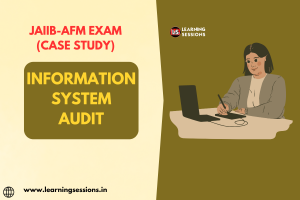The Junior Associate of the Indian Institute of Bankers (JAIIB) examination is planned to equip banking professionals with critical insights into the banking sector’s operational and financial frameworks. One compelling topic in the Accounting and Financial Management (AFM) module is the Information System Audit (IS Audit). This specialized audit focuses on the effectiveness, security, and reliability of information systems, which are integral to modern banking operations. Learning Sessions provides this article on the case study that explores the concept of information system audit.

📚 JAIIB Study Resources 📚
👉 Check Here
👉 Check Here
👉 Check Here
👉 Get Tests Here
👉 Check Here
DOWNLOAD PDF INFORMATION SYSTEM AUDIT -CASE STUDY
An Information System Audit (IS Audit) evaluates the controls and processes of an organization’s IT systems to ensure they support business objectives, maintain data integrity, and safeguard against risks like cyber threats, data breaches, and operational failures.
For the extensive preparation of candidates, get details through our YouTube videos for JAIIB AFM Module wise Syllabus with explanations and tips to help candidates in their preparation journey.
You may also like these JAIIB case studies:
JAIIB | AFM | TYPES OF VOUCHERS
JAIIB | AFM | TYPES OF EXPENDITURE
Key Objectives of IS Audit in Banking:
- Ensure Data Integrity: Validate the accuracy and consistency of financial and operational data.
- Assess Security: Identify vulnerabilities in IT systems and recommend mitigation strategies.
- Compliance Check: Ensure IT systems align with regulatory standards like RBI guidelines.
- Evaluate System Performance: Assess whether systems support business processes efficiently.
In the banking sector, where digital transactions and online services dominate, IS Audits are indispensable for:
- Preventing Cyber Threats: Protecting against unauthorized access and malware attacks.
- Enhancing Customer Trust: Safeguarding customer data builds confidence in digital banking services.
- Regulatory Compliance: Meeting strict requirements set by regulators like the Reserve Bank of India (RBI).
- Operational Resilience: Ensuring uninterrupted banking services by identifying and mitigating system vulnerabilities.
In the end, As banks progressively rely on technology for operations and customer interactions, Information System Audits are valuable to safeguard assets, ensure compliance, and maintain operational integrity. The JAIIB AFM module offers an all-inclusive infrastructure for mastering IS Audits, empowering banking professionals to manage IT risks and contribute to a secure and reliable financial system. Learning Sessions provides additional information about JAIIB AFM OVERDRAFT BALANCE by giving examples of real life scenarios.
Learn more about this case study through our YouTube channel and PDF.
Get access to our Telegram Channel for free Pdfs of JAIIB.
You May also Find these JAIIB Posts Useful
PROFIT AND LOSS ACCOUNT OF BANKING COMPANIES





